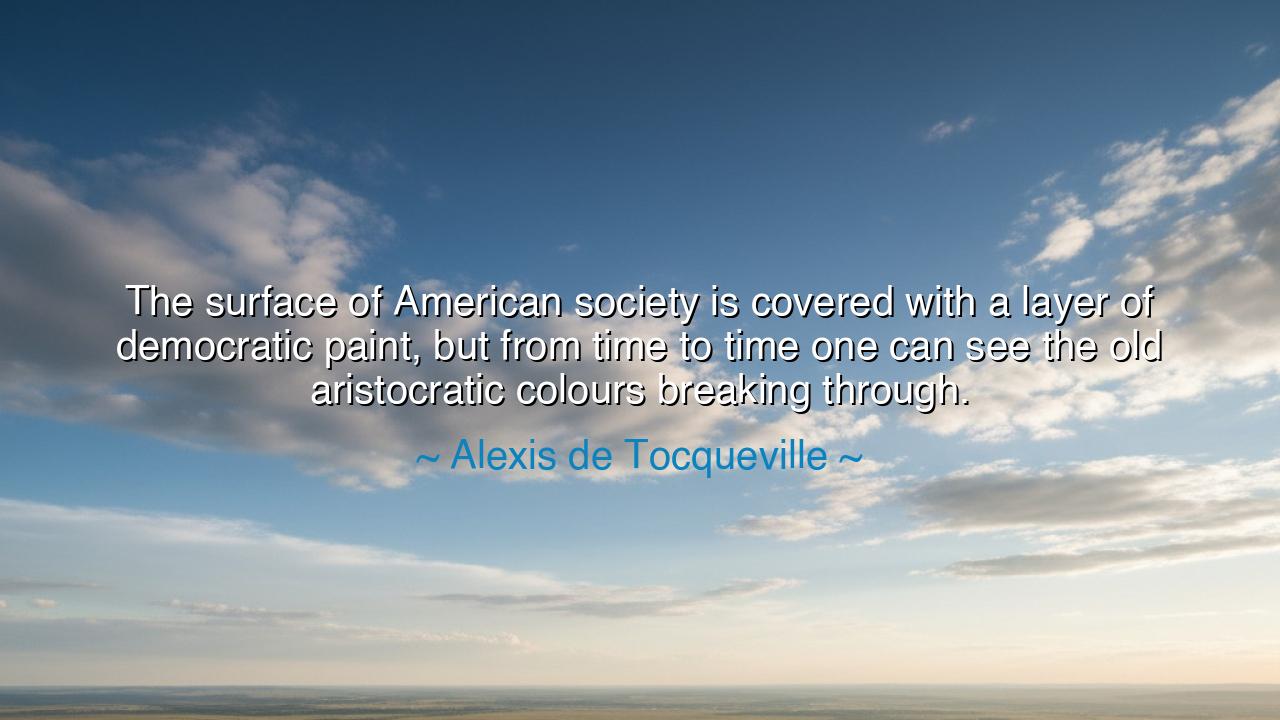
The surface of American society is covered with a layer of
The surface of American society is covered with a layer of democratic paint, but from time to time one can see the old aristocratic colours breaking through.






Hear the voice of Alexis de Tocqueville, the keen observer of nations, who once declared: “The surface of American society is covered with a layer of democratic paint, but from time to time one can see the old aristocratic colours breaking through.” These words are no idle metaphor but a piercing vision into the soul of a people. Democracy may adorn itself with bright colors of equality, freedom, and fraternity, yet beneath the surface, the shadows of privilege, hierarchy, and hidden aristocracy often remain, waiting to emerge.
The ancients too knew that societies are not remade in an instant. When Rome cast off its kings and crowned itself a republic, the language of liberty filled the air. Yet the patricians still held power, their wealth and lineage ruling unseen. Just as new paint cannot forever hide the weathered stone beneath it, so too the old aristocratic colours pierce through when wealth, power, and inherited advantage outweigh the cries of equality. Tocqueville’s words remind us that democracy is not a destination but a constant struggle, a battle to keep the old powers from reclaiming their throne.
Consider the tale of Reconstruction in America after the Civil War. The Union proclaimed freedom for the enslaved, and new laws promised equality before the law. For a time, it seemed the democratic paint glowed fresh and bright. Yet soon, the old aristocratic hues—racism, privilege, and entrenched power—began to show again. Jim Crow laws rose, denying rights in practice even as freedom was proclaimed in theory. Here we see Tocqueville’s prophecy fulfilled: the surface was democratic, but the undercurrents revealed ancient chains not yet broken.
This truth does not belong to America alone. It is the story of all peoples who rise against oppression and proclaim liberty, only to find that habits of the past cling tightly. Aristocracy is not always of bloodline; sometimes it is of wealth, of class, of influence. Whenever power concentrates in the hands of the few, the democratic paint begins to crack, and beneath it, the old patterns of domination reappear. This is not a cause for despair, but a call to vigilance.
For the lesson is this: freedom is fragile. Democracy is not a structure built once and forever; it is a wall that must be repainted, reinforced, and guarded in every generation. When the people grow complacent, the old colors return. When they forget the weak, ignore the poor, or exalt the wealthy as gods, then aristocracy is reborn under new names. Only through constant renewal, through courage to expose injustice, can the promise of equality remain alive.
And so, O listener, let this teaching be carved upon your heart: do not be fooled by appearances. Question the surface, and look beneath to see whether justice truly dwells there. Do not accept the trappings of democracy if its spirit is absent. If you see the old colors breaking through—be it in inequality, corruption, or privilege—take up the brush of truth and repaint with courage. For society is not remade by silence, but by the persistent labor of those who believe in equality.
Therefore, let Tocqueville’s words stand as both warning and guide: “The surface of American society is covered with a layer of democratic paint, but from time to time one can see the old aristocratic colours breaking through.” Let us not despair when cracks appear, but remember that vigilance and action are the guardians of freedom. Repaint, restore, and renew—until the promise of democracy is not a surface only, but the very foundation of society.






AAdministratorAdministrator
Welcome, honored guests. Please leave a comment, we will respond soon